Top #11 Trends in the Global Smart Metering Ecosystem to Watch for in 2025
Published on 8 January 2025

Climate change is undeniably real, and its effects go far beyond temperature increases and weather transitions. Today, it concerns the survival of humanity and the security of our food supply. Our current system, heavily reliant on fossil fuels and ageing infrastructure, is not serving our best interests. They are unreliable, inefficient, and environmentally destructive. The consequences are profound: families struggle to pay their bills, businesses face disruptions, and the most vulnerable among us are hit the hardest. Increasing levels of carbon in our atmosphere put immense stress on the Earth, resulting in a damaged climate and disrupted ecosystems.
In order to change the course, the world needs to transform its outlook towards sustainability. And smart meters could be the first step in our journey to create a sustainable future. By using advanced technology to collect precise, real-time energy consumption data, smart meters offer crucial insights that help us make informed decisions and promote positive change.
David Attenborough, a renowned environmentalist and broadcaster, made this compelling statement during the opening of the COP26 climate summit in Glasgow on November 1, 2021: “We are after all the greatest problem solvers to have ever existed on earth. We now understand this problem. We know how to stop the number rising and put it in reverse. We must halt carbon emissions this decade.” And the technologies, we currently use to manage and control our energy consumption are all set to play an indispensable role in our efforts against climate change.
In this blog, we’ll embark on a journey to understand how smart meters are illuminating a path towards a sustainable future. We’ll delve into their impact on the United Nations’ Sustainable Development Goals (SDGs) and explore their role in transforming the energy ecosystem.
Smart meters, integral to advanced metering infrastructure, are digital devices that continuously monitor and transmit real-time data on electricity, gas, or water consumption to utility companies, playing a crucial role in modern energy management.
Unlike traditional meters that rely on manual readings, smart metering offers precise and current consumption information, empowering utilities, and consumers alike to better monitor and control energy usage.
They are essential for developing smart grid infrastructure, which enhances the reliability, efficiency, and sustainability of electricity distribution through digital technology.

The United Nations Sustainable Development Goals (SDGs) represent a global blueprint for achieving a better and more sustainable future for all. Established in 2015 with the agreement of 193 member states, these 17 goals address pressing global challenges, including poverty, inequality, climate change, environmental degradation, peace, and justice. With a target completion year of 2030, the SDGs aim to unite governments, businesses, and civil society to create a more equitable and sustainable world.
Among the 17 SDGs, smart metering directly supports at least five goals: Affordable and Clean Energy (Goal 7), Sustainable Cities and Communities (Goal 11), Responsible Consumption and Production (Goal 12), Industry, Innovation, and Infrastructure (Goal 9), and Climate Action (Goal 13).

Impact of Smart Metering on Specific SDGs
Let’s explore the ways in which smart metering technologies play an instrumental role in advancing these specific Sustainable Development Goals and contribute to global efforts for a more sustainable and prosperous future:
SDG 7 – Affordable and Clean Energy
Goal 7 aims to ensure access to affordable, reliable, sustainable, and modern energy for all. Energy is a foundation of modern society, driving economic growth, social progress, and environmental sustainability. According to a report published by several international organisations, a full 675 million people worldwide still lack access to electricity, mainly in sub-Saharan Africa.
Smart metering technologies can significantly contribute to achieving this goal by enhancing energy efficiency and promoting the use of renewable energy sources. They provide real-time data on energy consumption, enabling consumers to better understand and manage their energy use. By identifying patterns and peaks in consumption, smart meters can help households and businesses reduce waste, lower energy bills, and shift to off-peak usage times, easing the strain on the grid.
According to data from Markets & Data, the Smart Meter market in India is expected to grow significantly, reaching USD 763.2 million by FY2031 from USD 250.71 million in FY2023, driven by a 14.93% CAGR between FY2024 and FY2031. This growth is primarily fuelled by the increased adoption of smart meters across the country, offering benefits to consumers and the energy sector alike. These meters promote energy conservation and sustainability efforts.
SDG 9 – Industry, Innovation, and Infrastructure
Goal 9 is about building resilient infrastructure, promoting inclusive and sustainable industrialization, and fostering innovation. Infrastructure development is crucial for economic growth, job creation, and improving living standards. However, traditional infrastructure systems often struggle to keep pace with rapid urbanization, climate change, and technological advancements.
Smart metering is a catalyst for innovation and infrastructure development. They provide detailed data on resource usage, helping create better infrastructure. For instance, smart grids, powered by smart meters, can balance supply and demand, reduce energy losses, and use renewable energy sources more efficiently.
SDG 11 – Sustainable Cities and Communities
Goal 11 focuses on making cities and human settlements inclusive, safe, resilient, and sustainable. As per the report by the United Nations, 68% of the world’s population is projected to live in urban areas by 2050. This urban growth presents both opportunities and challenges, particularly in terms of resource management, infrastructure development, and environmental impact.
Smart metering plays a key role in smart cities, which use data and technology to improve the quality of life for residents. By providing detailed information on energy usage, smart meters help city planners and policymakers design more efficient and sustainable urban environments. For example, data from smart meters can be used to optimize the distribution of resources, reduce waste, and enhance the resilience of infrastructure systems.
The city of Amsterdam, for instance, has given itself the target of reducing CO2 emissions in 2025 by 40% compared to 1990. Smart grids and meters will be an important part of the strategy to meet these targets.
India has taken a significant step forward in modernizing its power distribution network through the Smart Meter National Program (SMNP). With a budget of ₹1.5 lakh crore, this ambitious initiative plans to replace 25 crore traditional electricity meters with prepaid smart meters within the next five years. The SMNP represents more than just a technological upgrade; it signifies a transformative change in India’s energy management, advancing the country towards a future that is more efficient, resilient, and sustainable.
SDG 12 – Sustainable Consumption and Production
Goal 12 aims to ensure sustainable consumption and production patterns. This involves reducing the environmental impact of production and consumption, minimizing waste, and promoting resource efficiency.
Global energy demand is predicted to rise nearly 50% in the next 30 years, according to the U.S. Energy Information Administration. Smart metering contributes to responsible consumption and production by providing consumers and businesses with the information they need to make more sustainable choices. For example, smart energy meters can encourage energy-saving behaviours and the adoption of energy-efficient appliances and practices.
SDG 13 – Climate Action
Goal 13 is about taking urgent action to combat climate change and its impacts. Rising greenhouse gas emissions from human activities have altered weather patterns globally, leading to extreme events like hurricanes, droughts, excessive rainfall, and unusual temperatures. Statista’s report predicts that by 2050, 78 to 170 million people could be internally displaced due to climate change.
Upgrading to a smart meter can significantly reduce our environmental impact. Smart meters help individuals manage their energy use more efficiently, potentially saving substantial amounts of carbon. They are essential for integrating low-carbon technologies and renewable energy sources into a decentralized and digitalized electric grid.
SDG 17 – Partnerships for the Goals
Goal 17 concerns revitalizing the global partnership for sustainable development. The 2030 Agenda is a universal call to action for all countries, both developed and developing, to ensure no one is left behind. Achieving its goals requires partnerships between governments, the private sector, and civil society.
Likewise, implementing smart meters requires collaboration between governments, utilities, technology providers, and consumers. This partnership approach is essential for achieving the Sustainable Development Goals (SDGs) and creating a sustainable future.
Several countries and regions have successfully integrated smart metering to advance the Sustainable Development Goals (SDGs), showcasing the impact of these initiatives.
North America leads globally in smart electricity meter adoption
According to data from IOT Analytics, the region boasts the most mature smart electricity meter market, achieving nearly 77% penetration by the end of 2023. In the US, smart electricity meters have captured 76% of the overall electricity meter market as of 2023, largely due to extensive deployments by investor-owned utilities.
Moreover, smart meter shipments in the region are set to receive a further boost, with Canadian utilities Fortis and Hydro One announcing plans in 2023 to replace their existing AMI with second-generation smart meters.
The APAC region is the second-largest market for smart electricity meters globally, driven by extensive rollouts in China and Japan
APAC has over 1.1 billion electricity metering endpoints and accounted for nearly 60% of global smart meter installations in 2023. By the end of that year, smart meters were in use in 49% of the region, largely due to successful national efforts in China and Japan.
Looking ahead, countries like Australia, South Korea, India, Indonesia, and Singapore are planning widespread smart meter deployments, aiming for 67% adoption by the end of the decade.
India – Smart Meter National Programme
In 2021, India aimed to install 250 million smart electricity meters by 2025. They launched the Revamped Distribution Sector Scheme (RDSS) to support this, funding meter deployment and local manufacturing.
The program includes incentives for consumers to adopt smart meters, as well as integration with renewable energy sources like rooftop solar. Early results show improved billing accuracy, reduced distribution losses, and increased consumer awareness of energy consumption.
However, as of 2023, less than 3% of the goal was achieved, making it unlikely to meet by 2030. Despite this, India is set to lead globally in smart meter shipments and revenue by 2030.
Europe ranks third globally in smart meter adoption, with varying levels of adoption across different countries
By the end of 2023, smart electricity meters had achieved 47% market penetration across the continent. Countries like France, Spain, Italy, the Netherlands, and Scandinavian nations began nationwide rollouts over the last decade. In contrast, Greece, Hungary, Poland, and Romania started their initiatives more recently.
In the Middle East and Africa, Saudi Arabia and the UAE are at the forefront of smart meter adoption
Saudi Arabia and the UAE are at the forefront of smart meter adoption in the Middle East and Africa. By 2022, Saudi Arabia’s state-owned USP Saudi Electricity Company (SEC) had deployed around 11 million smart meters over three years. Meanwhile, the UAE has already installed 1.6 million smart electricity meters and aims to complete its nationwide rollout by the end of 2029.
The implementation of smart meters is a crucial element in modernizing energy infrastructure and promoting energy efficiency. Governments worldwide are increasingly prioritizing initiatives to encourage the adoption of smart meters among residents. This focus aims to enhance energy management, reduce carbon emissions, and contribute to a more sustainable future.
How Smart Metering Works as a Catalyst for a Sustainable Future
Smart meters are fundamentally reshaping the energy ecosystem in India and globally, accelerating a shift towards sustainability and efficiency. By contributing to multiple UN Sustainable Development Goals, these advanced technologies not only optimize energy consumption but also enable seamless integration of renewable energy sources, critical for reducing carbon footprints and advancing climate goals. As nations adopt smart metering solutions, they enhance grid reliability and empower consumers with real-time insights, fostering a more resilient energy infrastructure.
Kimbal is one of the leading providers of smart metering solutions, playing a pivotal role in modernizing energy infrastructure and driving energy efficiency. As of 2024, we have successfully deployed over 1 million smart meters nationwide, marking a significant milestone in their journey towards a more sustainable future. Find out how Kimbal is leading the way in smart energy solutions for a sustainable future – visit Kimbal for in-depth information.

Published on 8 January 2025

Published on 5 November 2024

Published on 31 October 2024
Your email address will not be published. Required fields are marked *